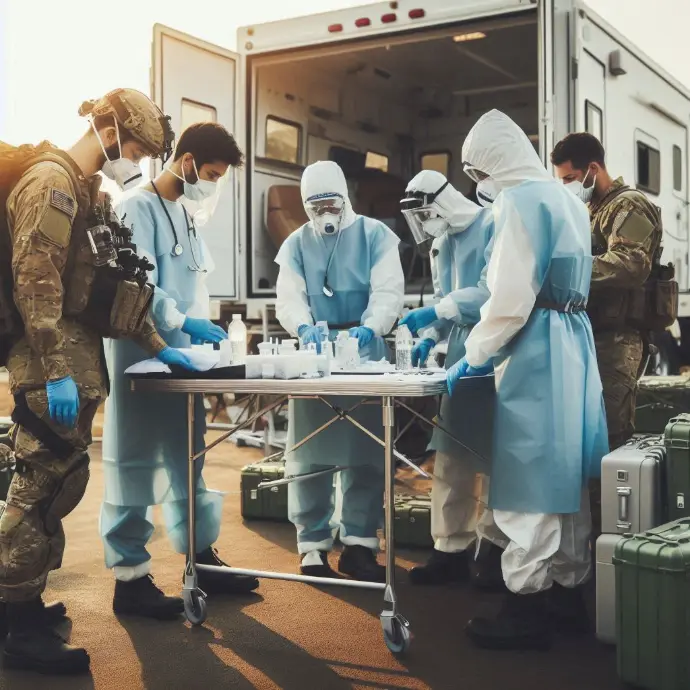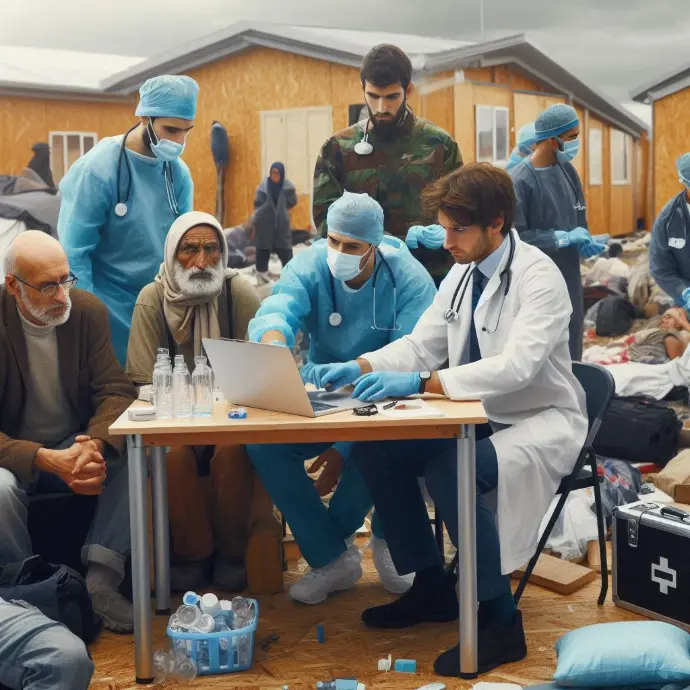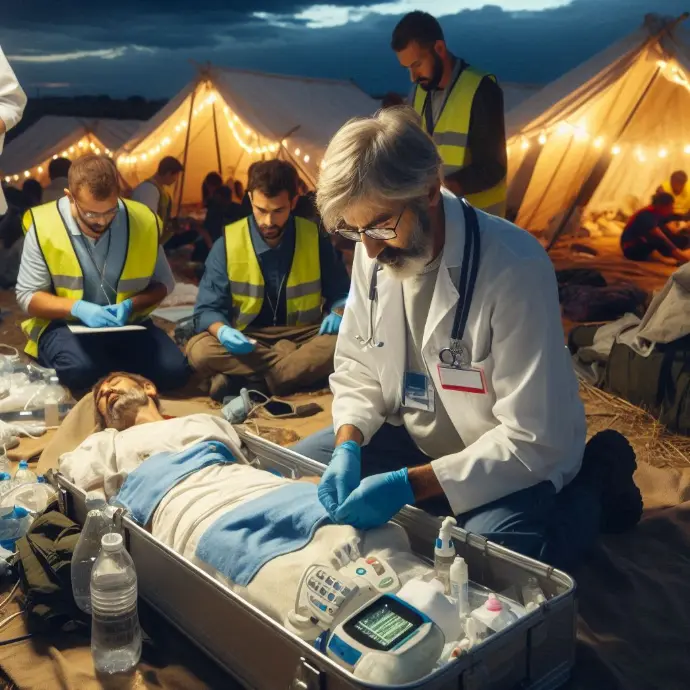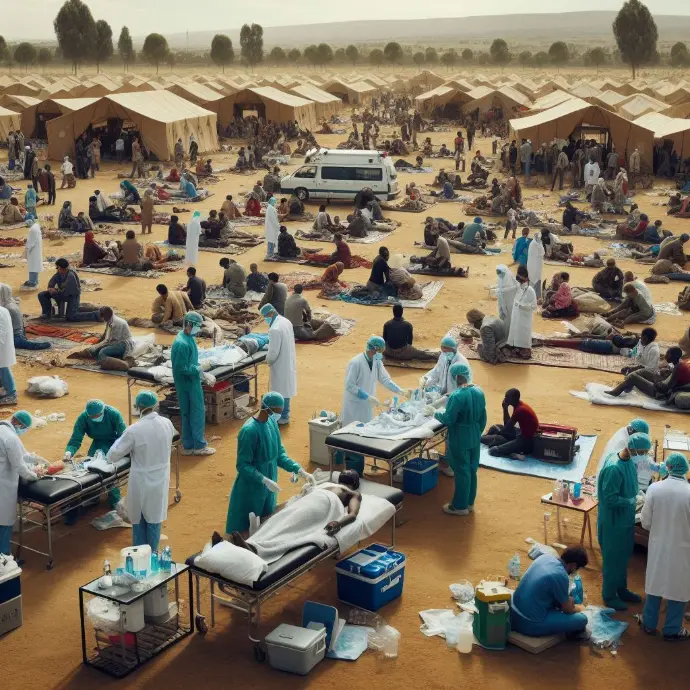
Crisis Zones: The Challenge of Ensuring Healthcare in the Midst of Chaos
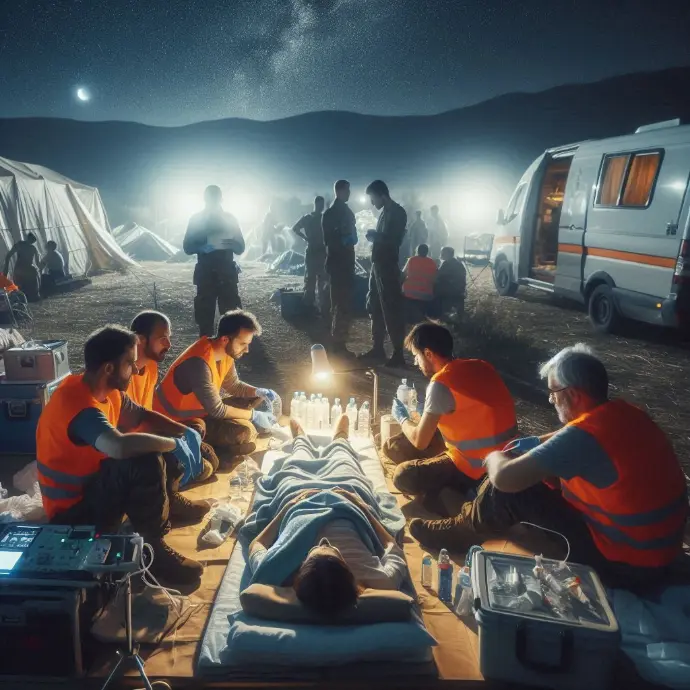
In our feature article, "Crisis Zones: The Challenge of Ensuring Healthcare Amidst Chaos," we unravel the complex issues of providing healthcare in crisis situations. Join us for a closer look at the challenges and solutions surrounding this crucial issue. Get ready to dive into a detailed analysis that will inspire you to be part of the change!
Introduction
Armed conflicts and humanitarian crises have a devastating impact on access to healthcare worldwide. In these situations, health systems often collapse, leaving vulnerable populations without access to essential medical services. Health infrastructure, including hospitals, clinics, and primary care centers, is severely affected by destruction, lack of supplies, and shortages of medical personnel.
Furthermore, insecurity and violence in these areas hinder the movement of healthcare workers and patients' access to care. The fear of being attacked, kidnapped, or injured deters many health professionals from providing services in these areas, further exacerbating the health care shortage.
In this context, preventable diseases and injuries that would normally be relatively easy to treat can become life-threatening, underscoring the urgent need to address access to health care in conflict settings.
Ensuring health care in crisis zones represents a multifaceted challenge that requires the collaboration of governments, international organizations, NGOs, and local actors. Providing health services amidst chaos requires implementing innovative strategies to overcome logistical obstacles, lack of resources, and insecurity.
Humanitarian interventions must be designed to adapt to changing conditions on the ground, which requires flexibility, responsiveness, and coordination among all parties involved. Careful planning, the provision of basic medical equipment, the training of local personnel, and the protection of health facilities are critical elements to ensuring that affected communities receive the medical care they so desperately need.
Furthermore, it is crucial to address the cultural, linguistic, and gender barriers that can hinder access to health care in crisis areas. Local communities must be an integral part of efforts to develop sustainable solutions tailored to their specific needs.
Addressing access to health care in conflict settings is a matter of fundamental human rights. The Universal Declaration of Human Rights establishes that everyone has the right to an adequate standard of living, including health care. However, in the midst of armed conflict and humanitarian crises, this right is systematically undermined, leaving millions of people without the medical care they desperately need.
Furthermore, lack of access to health care in crisis areas has long-term ramifications for public health, social stability, and economic development. The spread of disease, maternal and infant mortality, and the impact on mental health are just some of the devastating consequences of the lack of adequate healthcare in these settings.
Therefore, addressing access to healthcare in conflict-affected environments is not only a humanitarian issue, but also an imperative to ensure the stability and well-being of affected communities.
Current Situation of Access to Healthcare in Crisis Zones
In the midst of conflict and crisis zones, access to healthcare becomes a crucial challenge to ensure the health and well-being of the affected population. The availability of medical resources, the impact of insecurity on medical personnel, and the logistical challenges of distributing medical assistance are fundamental elements that require a thorough analysis to understand the complexity of the situation.
The availability of medical resources in crisis zones is a determining factor in providing adequate medical care to the affected population. The lack of supplies, medicines, medical equipment, and trained personnel represents a significant obstacle that negatively impacts the quality of medical care. Resource scarcity can also contribute to increased mortality and morbidity, especially among the most vulnerable groups, such as women, children, and the elderly.
Armed conflicts and humanitarian crises often result in the destruction of medical infrastructure, further hindering access to medical care. A detailed assessment of the availability of medical resources in these areas is essential to identify priority needs and coordinate effective humanitarian relief efforts.
It is critical to implement strategies to ensure a steady supply of essential medical resources, as well as support for rebuilding and strengthening the medical infrastructure in these crisis areas.
Insecurity in crisis areas poses a serious risk to medical personnel working in the provision of health care. Exposure to violence, threats, and attacks endangers the lives and safety of health professionals, which in turn affects the continuity and quality of available medical care. This situation negatively impacts the capacity to respond to medical emergencies, as well as the provision of primary and specialized care services.
Medical personnel face significant challenges in moving safely to affected communities, limiting their ability to provide timely medical care. Protecting medical personnel and ensuring a safe environment for carrying out their work are fundamental aspects that must be addressed to improve access to medical care in crisis areas.
The implementation of security measures, logistical support for the safe movement of medical personnel, and raising awareness about the importance of respecting humanitarian work are key elements to mitigate the impact of insecurity on medical personnel and ensure the continuity of medical care in complex environments.
Logistical challenges for the distribution of medical assistance in crisis areas represent a significant obstacle that hinders the affected population's access to necessary medical care. Damaged infrastructure, mobility restrictions, difficulties in air or land access, as well as political and social instability are all factors that impact the ability to effectively distribute medical supplies and equipment necessary for health care.
Coordination between humanitarian agencies, governments, non-governmental organizations, and local actors is essential to overcome these logistical challenges and ensure the efficient distribution of medical assistance in crisis areas. Detailed planning, the use of safe routes, and the implementation of innovative strategies are key elements to overcoming logistical obstacles and reaching the communities most in need.
Optimizing distribution processes, using tracking and tracing technologies, and adapting to the specific conditions of each crisis area are all aspects that must be considered to improve the logistics of medical aid distribution and ensure its timely delivery to those in need of urgent medical care.
The provision of healthcare in conflict zones presents several significant challenges that go beyond resource scarcity and damaged infrastructure. In these settings, access to healthcare is hampered by insecurity, a lack of trained personnel, disruption of health services, and the vulnerability of the healthcare professionals themselves. Furthermore, the presence of multiple parties to the conflict can further complicate the delivery of impartial and effective healthcare.
Healthcare in crisis zones is also affected by a lack of medical supplies, drug shortages, and the difficulty of transporting patients to adequate medical facilities. These factors combine to create an extremely challenging environment for healthcare providers and those seeking treatment. The need to adapt to changing and often dangerous conditions, as well as the ability to provide care in emergency situations, are fundamental aspects of healthcare in conflict zones.
Ultimately, ensuring medical care in conflict settings requires addressing not only immediate medical needs but also the logistical, security, and political challenges surrounding these situations. Adaptability, effective coordination among stakeholders, and a commitment to the principles of neutrality and impartiality are essential elements in addressing the challenges of providing medical care in the midst of chaos.
Human rights and access to medical care in conflict zones
Access to health care in crisis zones is supported by an international legal framework that recognizes the importance of guaranteeing the right to health at all times, including in situations of armed conflict or humanitarian crisis. International humanitarian law, in particular, establishes that parties to a conflict have the obligation to guarantee unrestricted access to medical assistance and health care for the civilian population. This is stipulated in the Geneva Conventions and their Additional Protocols, as well as in the Convention on the Rights of the Child.
Furthermore, the UN Guiding Principles on Business and Human Rights and the Universal Declaration of Human Rights also reaffirm the importance of ensuring access to health care at all times, without discrimination. These legal frameworks establish the obligation of States and other stakeholders to ensure that health care is available, accessible, of high quality, and culturally appropriate, including in crisis contexts.
The international legal framework recognizes access to healthcare as a fundamental human right that must be protected and guaranteed in all circumstances, including in conflict zones and humanitarian crises.
Unfortunately, in many armed conflicts and humanitarian crises, numerous human rights violations related to restricted access to healthcare have been documented. These violations include deliberate attacks on medical facilities, healthcare personnel, and patients, as well as the intentional obstruction of humanitarian aid and medical assistance.
These actions constitute serious violations of international humanitarian law and human rights law and have devastating consequences for the civilian population, especially for vulnerable groups such as women, children, the elderly, and persons with disabilities. Restricting access to healthcare not only endangers the lives and well-being of those affected, but also undermines the fundamental principles of humanity, neutrality, and impartiality that govern humanitarian assistance.
It is crucial to highlight that these human rights violations not only affect those directly involved in conflicts but also have a devastating impact on the international community's ability to provide effective humanitarian assistance and save lives in crisis contexts.
Restricted access to healthcare in conflict zones has a disproportionate impact on the civilian population, especially the most vulnerable groups. Pregnant women, children, older people, and people with disabilities are particularly susceptible to suffering the consequences of a lack of adequate medical care in crisis situations.
The disruption of health services, the destruction of medical infrastructure, and the shortage of basic supplies have devastating effects on the health and well-being of these populations. Furthermore, insecurity and violence around healthcare facilities discourage people from seeking the care they need, further exacerbating the humanitarian crisis.
The impact of restricted access to health care in conflict zones is particularly severe for civilians and vulnerable groups, underscoring the urgent need to respect and protect the right to health in all contexts, even amid the chaos of a humanitarian crisis.
Amid the chaos and despair that characterize crisis zones, ensuring access to healthcare becomes a crucial challenge for the international community. The provision of healthcare in conflict contexts is not only a humanitarian issue but also closely linked to the protection and promotion of fundamental human rights. Ensuring healthcare in crisis zones not only saves lives but also represents an ethical and legal imperative.
Healthcare in conflict zones not only entails the delivery of medical supplies and the presence of trained professionals, but also encompasses the protection of medical facilities and medical personnel. In this sense, the safety and security of healthcare workers are fundamental to ensuring the continued provision of medical services in hostile environments. This comprehensive approach not only seeks to ensure access to healthcare but also to establish the necessary conditions for its sustainable provision amid chaos and instability.
Ensuring healthcare in crisis zones requires not only an immediate and effective response, but also a long-term commitment to rebuilding and strengthening health systems in these regions. This involves not only addressing urgent medical needs but also addressing the underlying causes of the crisis, promoting stability and lasting peace as the foundation for the full enjoyment of the right to health in these affected communities.
Actions and strategies to improve access to healthcare in conflict zones
In the midst of crises and conflicts, ensuring access to healthcare is a crucial challenge that requires humanitarian interventions and effective international cooperation. Addressing this issue requires a thorough exploration and in-depth analysis of the specific needs of each crisis area.
Humanitarian interventions, coordinated through international cooperation, play a fundamental role in providing healthcare in conflict zones. Organizations such as Médecins Sans Frontières and the Red Cross, among others, work tirelessly to bring medical care to affected communities. These interventions not only provide medical treatment but also address disease prevention, health promotion, and the training of local personnel to ensure long-term sustainability.
International cooperation also plays a crucial role by providing financing, medical supplies, and logistical support to facilitate the delivery of healthcare in crisis zones. This collaboration between governments, non-governmental organizations, and humanitarian agencies is essential to overcoming the logistical barriers and challenges that arise in conflict environments.
Ultimately, humanitarian interventions and international cooperation are key to ensuring that populations in crisis zones have access to much-needed healthcare.
Local community empowerment plays a significant role in healthcare in conflict zones. By training community members to be primary care providers, access to basic healthcare services can be improved, especially in areas where the presence of trained medical personnel is limited. Furthermore, local community empowerment can contribute to building more resilient and sustainable healthcare systems in the long term.
Community empowerment strategies can include training health promoters, education on hygiene practices and disease prevention, and active community participation in the planning and implementation of health programs. By strengthening the community's capacity to care for its own health, a positive and sustainable impact is created on access to healthcare in conflict settings.
Local community empowerment not only improves access to healthcare but also fosters a sense of autonomy and resilience amid adverse conditions.
The use of technology, such as telemedicine and mobile applications, has proven to be a valuable tool in overcoming barriers to healthcare in conflict zones. Telemedicine enables the provision of healthcare services remotely, which is especially useful in settings where mobility is limited or access to medical facilities is dangerous.
Furthermore, mobile applications can facilitate communication between healthcare providers and communities, providing vital healthcare information, medication reminders, and access to support resources. These technological innovations not only improve access to healthcare but also contribute to data collection and epidemiological surveillance in conflict settings.
The use of technology offers significant opportunities to overcome barriers to healthcare in conflict zones, improving the efficiency and effectiveness of healthcare delivery under difficult conditions.
In the midst of crisis situations, ensuring access to healthcare is a crucial challenge that requires specific strategies tailored to the circumstances. Lack of resources, insecurity, and disruption of basic services are just some of the barriers that hinder the provision of healthcare in conflict zones. To overcome these challenges, it is essential to implement innovative strategies that enable the effective and sustainable delivery of healthcare.
One of the key strategies to ensure access to healthcare in crisis situations is the establishment of mobile clinics and emergency care units. These mobile facilities can travel to affected areas to provide immediate medical care to those in need. Furthermore, training local personnel in first aid and basic medical care can significantly contribute to expanding the reach of health services in crisis settings.
Another critical strategy is collaboration with humanitarian organizations and international agencies to coordinate the delivery of medical supplies and the provision of health services. Cooperation among different actors can optimize the use of limited resources and ensure that medical care reaches those most in need. Furthermore, the use of technology, such as mobile applications for health data management and telemedicine, can facilitate the provision of medical services in crisis settings where physical access to care is difficult.
Future Challenges and Outlook
The COVID-19 pandemic has had a significant impact on access to healthcare in conflict zones around the world. Communities already grappling with humanitarian crises have been further affected by the disruption of health services, shortages of medical supplies, and a lack of trained personnel. This situation has exacerbated existing difficulties and created greater urgency in finding solutions to ensure vulnerable populations receive the healthcare they so desperately need.
Access to healthcare in crisis contexts faces potential scenarios and trends that must be considered when planning future interventions. Population mobility, access to vaccines, resource availability, and the response capacity of humanitarian organizations are key aspects that will influence how healthcare is addressed in conflict zones. Analyzing these scenarios and trends is essential to anticipate challenges and design effective strategies to overcome them.
Global collaboration plays a crucial role in addressing access to healthcare in conflict zones. Cooperation between governments, non-governmental organizations, humanitarian agencies, and international actors is essential to ensure the effective and sustainable delivery of medical assistance. Synergy of efforts, sharing of resources and knowledge, and coordination of actions are fundamental elements that can only be achieved through strong and committed global collaboration.
Final reflections on the challenge of ensuring medical care amid chaos
The provision of medical care in crisis zones is a complex challenge that requires a comprehensive and coordinated approach. It is essential to recognize that medical care involves not only the availability of medical facilities and personnel, but also safe access to these facilities by the affected population. Furthermore, the safety of health personnel and medical facilities is essential to ensuring continuity of care in chaotic environments.
Collaboration between governments, humanitarian organizations, aid agencies, and the local community is crucial to overcoming the challenges of providing medical care in conflict zones. This includes coordinating resources, training local personnel, and raising awareness about the importance of respecting the neutrality and impartiality of medical facilities.
Ultimately, ensuring healthcare in the midst of chaos requires a sustained, long-term commitment to protecting human rights and ensuring equitable access to healthcare for all people, regardless of their geographic location or circumstances. Only through a comprehensive and collaborative approach can we make progress toward overcoming this challenging situation.

 IHRO NEWS
IHRO NEWS